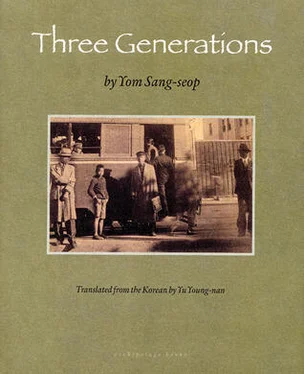When she saw that he was backing down, Gyeong-ae sprang to her feet.
“I don’t care. I thought you might have repented a little over what you had done to us and had come to your senses. They say you can never make a silk purse out of a sow’s ear,” she spat out before she left the room.
Sang-hun regretted having gone too far but made no attempt to keep her there. If he had held on to her, she would have found more fault with him. With her talk about the sow’s ear, he was forced to make an outward show of outrage to save face, if nothing else.
Innocence or Ulterior Motive

The morning after the incident at the police station, Byeong-hwa discovered a letter from Deok-gi on his desk. When he learned that Deok-gi had come by the previous evening and written it in his room, Byeong-hwa realized that they must have just missed each other. He was happy to find a ten-won note inside the envelope but still felt a twinge of regret. Had he known that his friend would go out of his way to leave money for him right before his departure, he would have made a point of seeing him off at the station rather than idling at Hwagae-dong, gorging on Chinese food. Byeong-hwa hadn’t made a special effort, though, because if he had shown up at the station under last night’s heavy snowfall, Deok-gi would have thought that his friend had made the trip only to collect the money he had asked for.
Deok-gi wrote: I dropped by to show you once and for all what a loyal friend I am, but the trip wasn’t entirely futile because at least I got to see Miss Pil-sun. It’s hard to write this letter with a smile on my face. I can never express myself lightly. When I’m gone, you’ll miss having cigarettes, so I’m leaving you my lunch money. I said this casually the other day, but if Miss Pil-sun really would like to study, just let me know. Surely, I can find a way.
At first, Byeong-hwa had no idea what his friend meant by the phrase that he could never express himself lightly. After rereading the note, though, he grasped its meaning by linking the part about Deok-gi’s being glad to see Pil-sun with his reiterating the offer to help her with her studies.
Staring at the letter, Byeong-hwa didn’t know whether to laugh or cry. The spoiled child of a rich family, who had never known anything resembling Byeong-hwa’s plight, Deok-gi might have developed a deep sense of sympathy, but would he have been this enthusiastic if Pil-sun hadn’t been in the picture? Deok-gi’s motives couldn’t be entirely innocent; he’d met Pil-sun only once. It was hard to believe that he offered to help simply because he felt she deserved a better life or because he took pity on her circumstances. Could he be so innocent? One could say that Deok-gi was being honest and sympathetic, expressing his feelings boldly and frankly, but what was behind Deok-gi’s fascination with Pil-sun? Was there some ulterior motive? He was, after all, a married man with a child.
It was possible that Deok-gi simply felt sorry for her, that his interest was prompted by nothing more than the sentimentality typical of a coddled child of a wealthy family. But Byeong-hwa felt he couldn’t just sit by passively. He feared that something unfortunate might occur between Deok-gi and Pil-sun.
Suppose the two fell madly in love, and Pil-sun could enjoy a luxurious life and her parents wouldn’t have to be hungry any more. What would this really mean? For Pil-sun’s family, it would amount to bartering their daughter, compromising their principles, and selling out their comrades. For Deok-gi’s wife and child, life would be hell. In short, nothing good would come of it. Byeong-hwa entertained such thoughts as if they were real, and soon his blood was boiling.
Still, the ten won left by Deok-gi was most welcome. More than anyone else, Pil-sun’s mother was overjoyed and couldn’t stop praising Deok-gi. Never mind that he looks gentle and elegant. No one else in the world would have braved such heavy snow, even for a good friend, and come all this way right before his departure just to give money. One would think the money were meant for her.
Byeong-hwa didn’t mind that his friend was being praised, and he knew that their friendship went beyond Pil-sun. Nevertheless, he was rather put off, thinking that it was partly Deok-gi’s vanity, his desire to show off to Pil-sun, that motivated him. Byeong-hwa therefore didn’t care to listen to the woman’s boundless praise.
He also didn’t feel like writing a thank-you postcard to Deok-gi; contrariness was the backbone of his character. He was grateful all right, but to write back promptly, as if swept by emotion, might come across as groveling. And as it was customary for someone who’d gone away to write that he had arrived safely, Byeong-hwa thought he’d write a reply then and take the opportunity to talk about his night out with Deok-gi’s father.
As Byeong-hwa expected, a short postcard arrived several days later offering the standard greetings. Deok-gi explained that he couldn’t write at length because he was busy preparing for his graduation exams. At the end, though, he asked Byeong-hwa to give his regards to Pil-sun and her parents.
Byeong-hwa smiled to himself — give his regards indeed! Deok-gi hadn’t even properly met the landlord and his wife. It was natural for him to think of Pil-sun’s parents when he was favorably inclined toward her, but Byeong-hwa didn’t think the comment was made simply out of politeness. Still, it could be an expression of his genuine goodwill and sympathy for the family’s extreme poverty. Viewing Deok-gi’s comment in this light, Byeong-hwa immediately felt as if a burden of suspicion had been lifted.
Who can comprehend the heart? Sometimes you will feel unaccountable hostility toward a stranger on a streetcar, sometimes your heart will be softened by a familiar-looking soul that passes you in the street. Deok-gi’s feelings toward Pil-sun’s family were probably of the latter sort. They were practically strangers to him, and it wasn’t by grace of Pil-sun’s looks that their situation merited more sympathy than anyone else’s. The recipient in these cases may or may not deign to accept such sympathy, but generating such goodwill in the first place is what people describe as being lucky with people in general. No one disliked Pil-sun’s family, and in fact, it seemed to attract goodwill. They were good-hearted, decent folk.
Byeong-hwa’s thoughts ambled along these lines as he reclined on the floor. Then he snapped up and went to the desk, which, like his hair, was coated with a thin gray layer of dust. He had the urge to write about how he had spent the evening with Deok-gi’s father.
Hey, I couldn’t make it to the train station to say good-bye because the Bacchus queen’s shower of kisses (well, they might have been closer to a torrent) and the hot, wet blur of those kisses interfered with my intention to see you off. I’m not boasting or making excuses but just honestly confessing — reporting — that I was at the zenith of happiness that night, which I’d never before experienced. I’ve had butterflies in my stomach since — not that an earthquake has shaken up my convictions or my view of life, but a blush rises to my cheeks when I imagine going to that bar again. I think of getting a haircut, dusting off my clothes, and putting on face cream, if possible. Hey, are you laughing? Don’t. It’s true. You left cigarette money with that remarkable letter of yours the other day, but you may have to give me money for face cream, too. At least I got rid of that sorry overcoat. I’ll explain the details later, but there’s a saying that everyone has a place in which to be buried in one of the green mountains, so people can choose to live one way or another in this world. What I mean is that, fortunately, my coat was torn to shreds on a certain occasion. So your father — in the spirit of charity — gave me his spare overcoat. To my astonishment, I look like a neat gentleman in this royal hand-me-down, even in my eyes, the eyes of a nobody. I yearn for an audience with the Bacchus queen, sporting this overcoat, but I might embarrass myself because the coat is clearly secondhand, and besides, I also need cash for drinks. I’m entertaining the idea of going there after pawning the coat, but to do so, the weather must warm up. A rumpled jacket and pants won’t do, like a bird with missing tail feathers. Even now, looking at the coat hanging on the wall, my mouth waters.
Читать дальше













